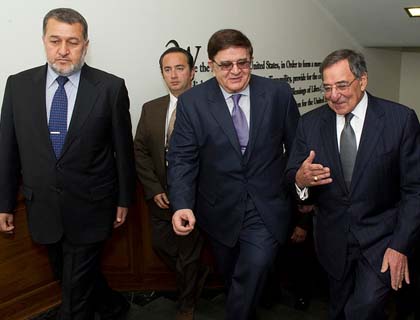WASHINGTON - Afghanistan's defense and interior ministers said they urged Defense Secretary Leon Panetta to ensure that maintaining security takes precedence over cutting costs in determining U.S. support for their nation's army and police.
The U.S. has projected that the Afghanistan forces it is helping to train and fund will reach a peak of 352,000 before October, a goal estimated to cost more than $4 billion a year. The military and police would then be reduced as security improves, to about 230,000 by 2017.
"The security environment by itself will either agree with the figures or not," Afghan Defense Minister Abdul Rahim Wardak told reporters yesterday at his nation's embassy in Washington after talks with Panetta at the Pentagon. "That is something that is subject to revision."
The appeal reflects concern by Afghan leaders about the forces they need to counter the Taliban and associated militant groups as the U.S. and its allies begin to exit. PresidentBarack Obama is counting on Afghans taking over more of the fight so that the U.S. can withdraw more of the 68,000 troops that will remain after an initial round of cuts is completed in September. Panetta aims for a "sufficient and sustainable" Afghan force after 2014, the Pentagon said in a statement after yesterday's talks, without offering specific numbers.
The U.S. and its allies plan to withdraw most of their forces by the end of 2014. Planned Reduction Democratic Senator Carl Levin of Michigan, chairman of the Senate Armed Services Committee, questioned Army General John Allen, the top allied commander in Afghanistan, about the planned reduction in Afghan forces during a hearing on March 22 in Washington.
The U.S. estimates the Afghan government can contribute about $1 billion annually toward security costs. "Given the fact that transition to a strong Afghan security force is the key to success of this mission, why does it make sense to talk about reducing the size of the Afghan army by a third?" Levin said. Wardak called the U.S. projections "a conceptual model for planning purposes" based on certain assumptions, including improved security. "There's enough flexibility there to not detach ourselves from the reality on the ground," Wardak said.
Violence has decreased by 20 percent since 2010, Wardak said. That's the year the U.S. added 33,000 of its troops to reverse Taliban gains. In addition to the 68,000 American forces that will remain after those "surge" troops are withdrawn in September, other countries will have 40,000 on the ground and have said they plan to cut their numbers as well. Sustaining Improvement
Afghan Interior Minister Bismillah Mohammadi said he is particularly concerned that his police officers get enough training and equipment in coming years, especially as they make the transition from fighting alongside their army to a more traditional law enforcement role.
He said Panetta pledged continuing U.S. aid, including trainers, "so that this improvement in the quality of the Afghan national security forces can be sustained well past 2014." The two sides didn't discuss specific numbers, Mohammadi said, speaking through an interpreter. The officials also discussed in detail recent attacks by Afghan security forces on coalition troops, Wardak said, speaking in English.
"We are taking a lot of preventive measures," he said, citing extra security and additional intelligence and counter-intelligence efforts to prevent such incidents. "The majority, up to 70 percent, are not related to the infiltration" of enemies into Afghan forces.
After 2014 The U.S. military has reached agreement with Afghan officials to turn over responsibility for detention facilities and to set rules for nighttime special operations missions. While those steps help pave the way to a long-term agreement the two sides hope to complete before a North Atlantic Treaty Organization summit in Chicago next month, they leave other issues unresolved for the U.S. presence in Afghanistan beyond 2014. (Agencies)

